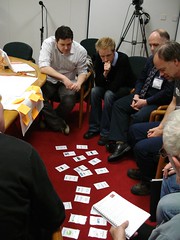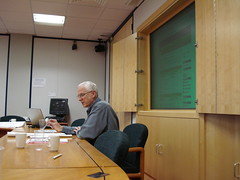
OurPress is a project I have been working on for aaaages, which stalled quite badly for a while. Essentially, the idea emerged in a discussion with Nick Booth in the comments of a blog post of his. We were talking about the paucity of options available to community groups to easily create open, social websites. At first I thought of Drupal, but soon moved on from there.
I had the idea of setting something up with the multi-user version of WordPress, called WordPressµ, which is what is used to run WordPress.com. Sites could be created either as blogs, or as static sites using WordPress pages. Help and guidance would be provided in getting stuff up and running, and customisation of templates would be possible, with the results being shared among the rest of the users too. I gave the idea the name OurPress, and was shocked to find the .org was still available. I snaffled it right away, as well as a few of the .whatever variants.
Then the project pretty much stalled, for two reasons. One, I forgot about it (probably because of Facebook or Twitter or something equally shiny); and two because I couldn’t find anywhere decent to host it. The trouble was that WordPressµ demands that you have something called ‘wildcard DNS’ to be able to create blogs at addresses like myblog.ourpress.org (for example). The other option is to have them at ourpress.org/myblog but problems can be created with static pages having the same name as blogs and the whole thing getting confused.
However, I recently returned to looking at the project, after a chat with Shane McCracken, and in my search for a host, I hit upon gold, or rather orange, in the form of A Small Orange. ASO are a bunch of cool guys in the US who happily host pretty much anything. They were quite happy to set up the wildcard DNS for me and when I asked if I could integrate with Google Apps, someone went ahead and amended all my MX records for me! Ace stuff!
Here’s the deal with the Google Apps: I get to have 200 accounts for free, so I can pretty much offer everyone who has an OurPress blog a free email account which will be blogname@ourpress.org. When I create the email account I will also setup an OurPress branded iGoogle page which will track web responses to the blog in question, so people have that important element set up even if they haven’t heard of RSS themselves before. Also, using Sites, I will give them access to a tonne of documentation about using the OurPress platform and blogging, social media etc.
Essentially, OurPress will be a completely contained and functional online platform to run community websites. And it’ll be free.
So who might want to use OurPress?
- Community groups, whether based around a club or a village without any resources to put into developing a website
- Individuals who want to start a site to create a community online
- People who want to develop a project to help communities or civic life in general
- Individuals who want to blog about their work within the community
- Small charitable or not-for-profit organisations or projects that don’t want to invest in their own domain, hosting etc just yet
- Local politicians, perhaps
The advantages of OurPress over, say, WordPress.com include:
- Support in setup and running from me and anyone else who fancies getting involved (hint, hint)
- The Google Apps integration
- Folk will know that it is a ‘safe’ platform with no content hosted that will possibly reflect badly on them/their organisation
- The creation of a community around all those on the platform
- No adverts anywhere (and there are ads on WordPress.com, folks)
So where am I up to? I’ve installed WordPressµ and that’s about it. I need to get a look ‘n’ feel sorted for the homepage and arrange how the sign-up process will work for new blogs, but other than that, I am more or less there. Any comments or suggestions gratefully received!



